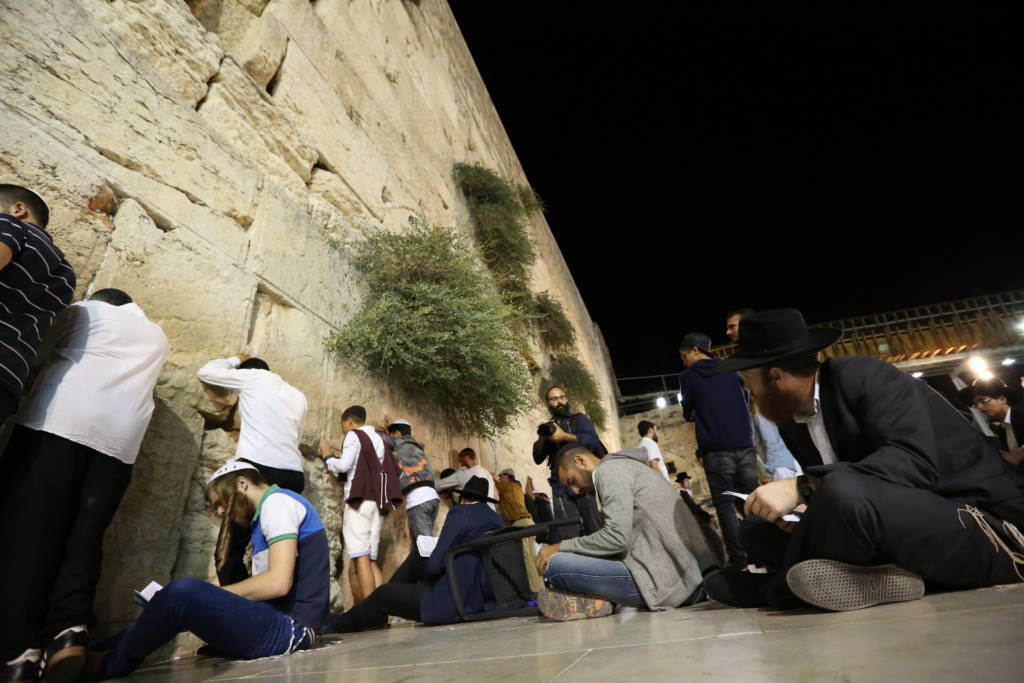Jews traditionally mark Tisha B’Av by fasting the entire day, reading from the Book of Lamentations, and observing other mourning customs.
By Noah Michaeli, TPS
As the Middle East speculates how and when Iran will follow through with an expected attack on Israel, the possibility exists that it will take place on Tisha B’Av, a Jewish day of mourning that begins at sundown on Monday.
“I won’t say it’s not scary, but the fact that they are possibly attacking on Tisha B’Av, as a religious Jew, strengthens me, because it says that God is indeed running the world,” Rabbi Asher Resnick, a a Jerusalem educator for more than 35 years and author told The Press Service of Israel.
And that, Resnick added, “is very encouraging.”
Tisha B’Av, the ninth day of the Hebrew month of Av, is the saddest day of the Jewish calendar. It commemorates numerous tragedies in Jewish history, all of which happened on this date — most notably, the destruction of both the First and Second Temples.
Other events on the Ninth of Av include the expulsion of Jews from England in 1290 and from Spain in 1492, and the 1914 assassination of Archduke Franz Ferdinand, which is generally regarded as what sparked World War I.
In 1942, the mass deportation of Jews from the Warsaw Ghetto to the Treblinka extermination camp began.
But Resnick told TPS-IL that Tisha B’Av goes back to the Biblical story of the Spies.
“The root issue was when the Jews were about to enter Israel after leaving Egypt, they wanted to send spies,” he explained. “They sent 12, one from each tribe. Ten brought back a negative report, and only two brought a positive report. Everyone started crying and saying how terrible it was that God was giving them bad land.”
“According to Jewish tradition, God responded, ‘You, the Jewish people, cried this night for nothing. Therefore, I will establish for you a crying on this date for all generations,’ and from there, Tisha B’Av was born,” Resnick said.
Regarding the loss of the Temples, Jews don’t just mourn “the destruction of some building that they’ve never seen,” but also the loss of the close relationship with God that those buildings represented, he explained.
“Once a person realizes that things in Jewish history are not random, that itself can help a person trust in God. Because you realize that God runs the world, even if what is occurring is difficult. The fact that it happens specifically on that day helps to restore our faith,” Resnick explained.
A recent Sky News Arabia report suggested that Tehran may attack during Tisha B’Av specifically because of the psychological effect the timing would have. According to the report, such an attack would have a demoralizing effect on Israelis.
Jews traditionally mark Tisha B’Av by fasting the entire day, reading from the Book of Lamentations, and observing other mourning customs. The Israel Defense Forces Military Rabbinate instructed soldiers not to fast during the Tisha B’Av day of mourning if they are engaged in “operational activities.”
Israel has been bracing for an attack since the assassination of Hamas leader Ismail Haniyeh in Tehran. Israel has not confirmed or denied responsibility for the assassination.
Hezbollah has vowed revenge for a separate Israeli airstrike in Beirut which killed Fuad Shukr. He was responsible for a deadly rocket attack on Majdal Shams, which killed 12 children in the Druze village.
A member of Hezbollah’s Jihad Council, the terror group’s highest decision-making body on military affairs, Shukr was regarded as Hezbollah’s “Defense Minister” and right-hand man to Hezbollah chief Sheikh Hassan Nasrallah.
Nearly 80,000 Israelis were forced to evacuate their homes near the Lebanon border when Hezbollah began launching rockets and drones in October. Hezbollah leaders have said they will continue the attacks to prevent Israelis from returning to their homes. The attacks have killed 26 civilians and 18 soldiers.
Israeli officials have been calling for Hezbollah to be disarmed and removed from southern Lebanon in accordance with UN Security Council resolution 1701, which ended the 2006 Second Lebanon War.
At least 1,200 people were killed, and 252 Israelis and foreigners were taken hostage in Hamas’s attacks on Israeli communities near the Gaza border on October 7. Of the 111 remaining hostages, 39 have been declared dead. Hamas has also been holding captive two Israeli civilians since 2014 and 2015, and the bodies of two soldiers killed in 2014.
Do You Love Israel? Make a Donation - Show Your Support!
Donate to vital charities that help protect Israeli citizens and inspire millions around the world to support Israel too!
Now more than ever, Israel needs your help to fight and win the war -- including on the battlefield of public opinion.
Antisemitism, anti-Israel bias and boycotts are out of control. Israel's enemies are inciting terror and violence against innocent Israelis and Jews around the world. Help us fight back!
